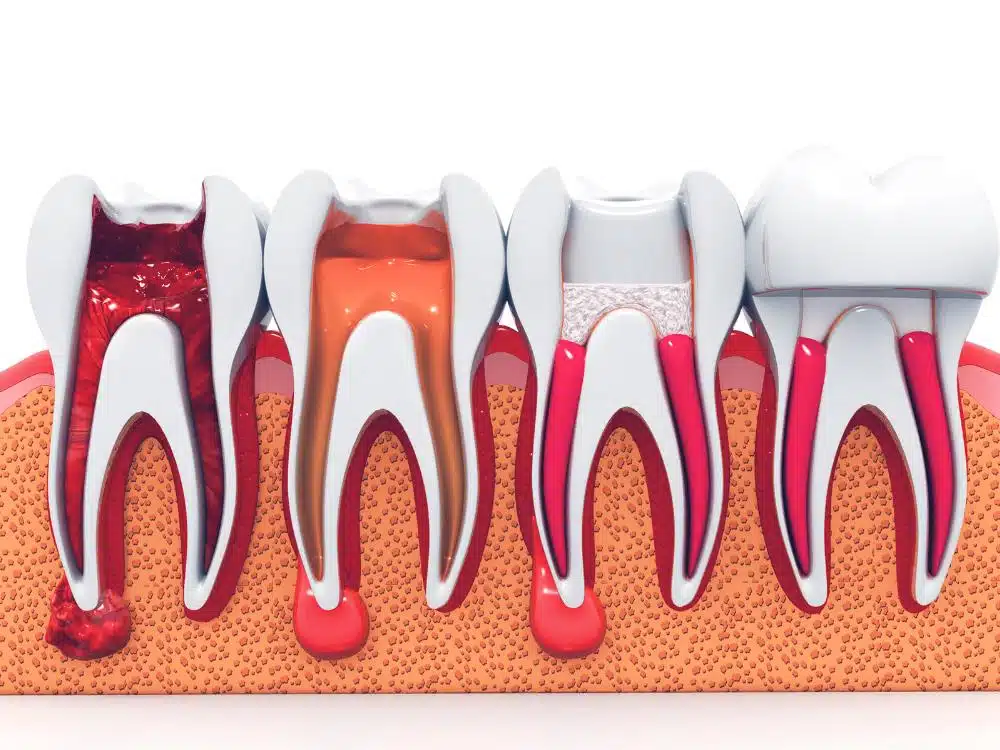 Minimal-Discomfort Care for Severely Damaged Teeth
Minimal-Discomfort Care for Severely Damaged Teeth
Root canal treatments are an important restorative treatment that can save your damaged tooth and protect the esthetics of your smile. Although many people believe that root canals involve significant discomfort, under the care of our experienced Garland dentist, Dr. Scott Dooley, our procedures are very gentle. For most patients, the overwhelming sensation is one of relief from their toothache.
What is a Root Canal?
A root canal is a dental procedure used to treat infection at the center of a tooth (the root canal system). The treatment involves the removal of the damaged area of the tooth (the pulp), cleaning and disinfecting it, and then filling and sealing it. The common causes of this damage are cavities, cracked or fractured teeth due to trauma or decay, or repeated dental procedures on the tooth.
The Importance of Root Canals
In most cases, a root canal treatment is the only way to save an infected tooth. If you do not receive this treatment, the decay will spread. Not only will this cause significant discomfort; you may completely lose the tooth. The bacteria can also move to your other teeth, your gums, and even your jawbone. Fortunately, root canal therapy can protect your oral health, prevent further dental damage, and enhance the appearance of your infected tooth.
Signs You May Need a Root Canal
Most of the time, Dr. Dooley performs root canals to treat a dental infection, but in some cases, he may use the procedure to address a cracked tooth. Although a toothache is the most common symptom of dental infection, other symptoms include:
- Sensitivity to heat or cold
- Pain or sensitivity when biting down
- A gum abscess
- Internal discoloration on a single tooth
Note that not every toothache is an indication of dental infection. Dr. Dooley will conduct a complete exam, and he will typically take digital x-rays before recommending root canal therapy.
What Happens during a Root Canal?
Before performing a root canal, Dr. Dooley will numb your tooth, so you will feel little more than a slight pressure throughout the process. Like many patients, you may still feel nervous about the procedure. We offer several dental sedation options that will help you relax during your treatment. After you receive local anesthesia and any additional sedation, Dr. Dooley will clean out your tooth and root canals. He will remove all bacteria, as well as any infected pulp or damaged dental material. When your tooth is bacteria-free, he will fill it with a soft rubber compound, and he will top your tooth with a custom-made dental crown.
How To Prepare For Your Treatment
Before Your Appointment:
- Medication: If you’ve been prescribed antibiotics for an infection, make sure to take them as directed before your procedure. Inform your dentist of all medications you are currently taking.
- Eating and Drinking: Eat a normal breakfast or lunch before the procedure, as local anesthesia will be used. Avoid alcohol for at least 24 hours before your appointment.
- Oral Hygiene: Brush your teeth and floss before your appointment to reduce the risk of infection.
- Comfortable Clothing: Wear comfortable clothing to your appointment, as you will be sitting in the dental chair for a while.
- Arrange Transportation: If you will be receiving sedation, arrange for someone to drive you home after the procedure.
- Anxiety Management: If you feel anxious about the procedure, discuss sedation options with your dentist beforehand.
- Rest Well: Get a good night’s sleep before your appointment.
Post-Treatment Recovery Advice
After Your Procedure:
- Rest: After your root canal, rest and avoid strenuous activities for the rest of the day.
- Diet: Eat soft foods for a few days; avoid hard, chewy, or hot foods. Do not eat until the numbness wears off to avoid biting your tongue or cheek.
- Pain Management: Some discomfort is normal. Use over-the-counter pain relievers as directed by your dentist in Garland, TX. Avoid aspirin as it may increase bleeding.
- Oral Hygiene: Continue to brush and floss, but be gentle around the treated area. Avoid vigorous rinsing.
- Avoid Pressure: Try not to chew or put pressure on the treated tooth until it’s fully restored with a permanent filling or crown, as it might be fragile.
- Swelling: If you experience swelling, apply a cold compress to the area for 20 minutes at a time.
- Follow-up Appointments: Attend any follow-up appointments to have a permanent filling or crown placed.
- Watch for Complications: Contact Dr. Dooley if you experience severe pain, visible swelling, an allergic reaction to medication, or if your temporary filling comes out.
- Medications: If you’ve been prescribed antibiotics, take them as directed until they are finished, even if all symptoms and pain have gone.
- Restoration: Schedule an appointment for a permanent restoration (filling or crown) as advised by Dr. Dooley. This is crucial to protect the tooth from future damage and to restore it to full functionality.
Frequently Asked Questions
Q: Is a root canal procedure very painful?
A: Modern techniques and anesthesia make root canal treatments no more painful than a routine filling. Most discomfort stems from the infection before the procedure, not from the treatment itself.
Q: Can root canal treatment cause illness or affect overall health?
A: There is no valid, scientific evidence linking root canal-treated teeth and disease elsewhere in the body. This myth is based on long-debunked research from the early 1900s.
Q: How long does the procedure take?
A: Typically, a root canal takes about one to two hours. However, the duration can vary depending on the complexity of the tooth and the extent of the infection.
Q: Will I need to take time off work after a root canal?
A: Most people can return to work or school immediately. Some may prefer to take the rest of the day off due to residual numbness from the anesthesia or minor discomfort.
Q: Are there alternatives?
A: The main alternative is tooth extraction. However, replacing an extracted tooth with a dental implant or bridge is more costly and time-consuming. A root canal is a preferable option to save the natural tooth.
Q: Can all dentists perform root canal treatments?
A: While all dentists are trained in root canal therapy, some complex cases may be referred to an endodontist, a specialist in this field.
Q: How successful are they?
A: Root canal treatments have a very high success rate, above 95%. Treated teeth can last a lifetime with proper care.
Q: Is it safe to have a root canal while pregnant?
A: Yes, root canal treatment is safe during pregnancy. Necessary precautions, like using appropriate anesthesia and lead aprons for X-rays, are taken to protect the mother and the fetus.
Q: Do root canal treatments weaken the tooth?
A: The procedure itself doesn’t weaken the tooth, but the tooth may be more brittle afterward due to the removal of tissue and sometimes a significant amount of tooth structure. A crown often helps to protect the tooth.
Q: How long will the tooth last after a root canal?
A: With good oral hygiene and proper care, including a crown or a filling as recommended, a tooth that has had a root canal can last a lifetime.
We Provide Gentle Root Canals in Garland, TX
To find out if root canal treatment is necessary to save your tooth, schedule a consultation with your dentist by calling Scott Dooley Dentistry in Garland, TX, today at 972-495-8100. We also proudly serve the residents of Dallas, Richardson, Wylie, Sachse, and all surrounding communities.


 Minimal-Discomfort Care for Severely Damaged Teeth
Minimal-Discomfort Care for Severely Damaged Teeth